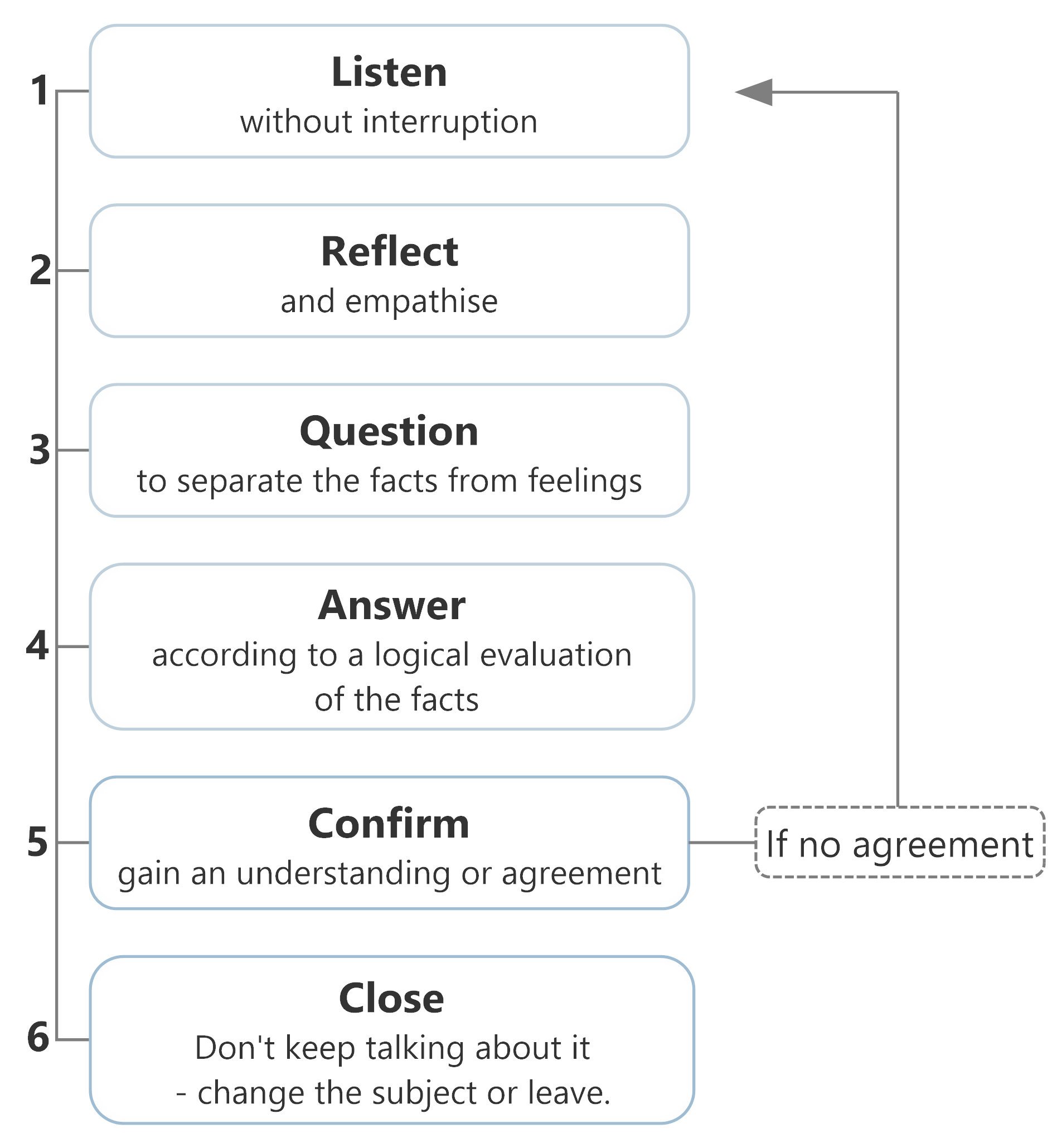How to Handle a Complaint
How to Handle a Complaint
It is important that all your staff are trained in handling customer complaints.
Here is the six-step method to use when handling a complaint:
1. Listen without interruption.
2. Empathise with their feelings.
3. Question them to isolate the facts from the feelings.
4. Answer the factual objection to the best of your knowledge, complying with company policy and the law.
5. Confirm understanding.
6. Change the subject.
Six-Step System for Handling Objections

Step one: Listen without interruption - Hear them out
Listen to the person without interruption.
Let them "Get things off their chest".
Step two: Reflect their position back to them
Restate their position and reflect back their emotions.
Memorise and use the phrase, "I understand you feel [description] and I want to help, so would you let me ask you a few questions?"
Empathise how they are feeling.
You must show empathy without necessarily showing any agreement.
Step three: Question down
Now you need to ask questions to discover the underlying facts.
You need to separate facts from the feelings, facts from the opinions, facts from accusations.
Your task is to narrow the objection to the "one most important thing".
You need to isolate the objection.
Step four: Answer their point to the best of your knowledge
Give them the best answer that the facts, your knowledge and your organisation will allow.
They must understand what your answer is. (Be clear).
They must understand the reasons for your answer. (Be rational).
Step five: Confirm agreement / understanding
Ensure that the person agrees with your answer.
People will either agree with you or not.
If they don't agree, or understand, return to step one.
And take them once more around the cycle.
If when they do agree, then move to step six.
Step six: Change the subject (or close the conversation)
The moment you have an agreement, change the subject.
Ask a reflex question.
A reflex question is a question they can answer easily and has the effect of changing the subject.
You need to develop three or four reflex questions that you can ask, whenever you need to change the focus of a conversation off the current topic.
Start with the phrase, "By the way, just for my notes what ...
- Is your direct line phone number?"
- Do you have a middle name or initial?"
- What is your work postcode?"
Once you have an agreement on the minor objection, change the subject.
Do not keep talking about a problem after you have resolved it.
Further reading: Delivering Effective Customer Service (Blog).
Definition: Six-step complaint handling method
In customer service, the six-step complaint handling method is a process that uses six clear moves-listen, show empathy, ask for facts, give a fair answer, check agreement and then steer talk to a new topic. It keeps the talk calm, fixes the real issue and protects the link with the customer.
Show CG4D Definition
- Runs through six set moves in the same order
- Splits facts from feelings to find the real issue
- Seeks clear agreement before moving on
- Ends by changing the topic to close the case
Article Summary
Treat each complaint as a win-back moment: listen without interrupting, empathise, question for facts, answer clearly, confirm agreement and then change the subject; companies that master this six-step cycle fix issues first time and keep up to 93 % of their customers.
Frequently Asked Questions
Here are some questions that frequently get asked about this topic during our training sessions.
What are the six steps to handle complaints mentioned here?
Why must I listen without interrupting a complaining customer?
How can I show empathy without agreeing with the complaint?
What type of questions isolate the facts from feelings?
How should I answer a customer’s objection within company policy?
What is the best way to confirm understanding after you answer?
Why do you change the subject once agreement is reached?
Thought of something that's not been answered?
Did You Know: Key Statistics
Qualtrics 2024 Consumer Trends study says 74% of UK shoppers stop buying from a brand after a single poor complaint response. Gartner 2024 Customer Service study finds firms that solve a complaint on the first contact keep 93% of customers, but those that take longer keep only 68%.Blogs by Email
Do you want to receive an email whenever we post a new blog? The blogs contain article 5-10 minutes long - ideal for reading during your coffee break!
Further Reading in Conflict Management and Handling Difficult People
-
How to Deal with Conflict Situations
Learn a simple three-step conflict management method: stay calm, state facts, ask for change. Boost communication skills and resolve workplace clashes fast.
Read Article > -
How to handle workplace conflict
Learn how to handle workplace conflict with calm talk, exact facts and positive action. Follow clear steps to avoid misunderstandings and resolve issues fast.
Read Article > -
How to Handle Conflict Situations
Learn conflict management skills that turn workplace clashes into progress. Apply clear facts, good timing, calm body language and praise for resolution.
Read Article > -
Management skills training - Giving constructive criticism
Learn how to give constructive criticism that fixes mistakes, lifts performance and protects team morale. Clear steps, real examples, expert tips for managers.
Read Article > -
How to deal with a smelly person at work
Need to tackle body odour at work? Learn a simple, six-step script to hold a private, respectful talk, handle every reply, and keep trust and team morale intact
Read Article >
Looking for Conflict Management Training?
If you're looking to develop your Conflict Management and Handling Difficult People Skills, you may find this Conflict Management Training Course beneficial:
Open Training Course Pricing and Availability
Next Open Course Starts in 8 days, Manchester City, places available






